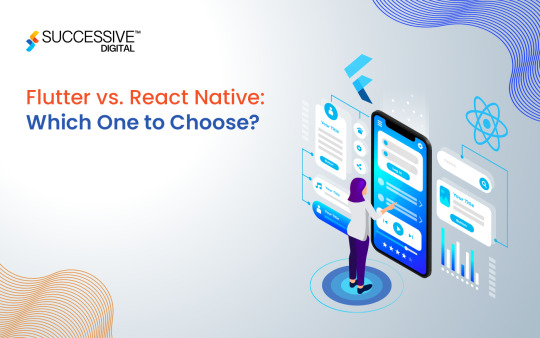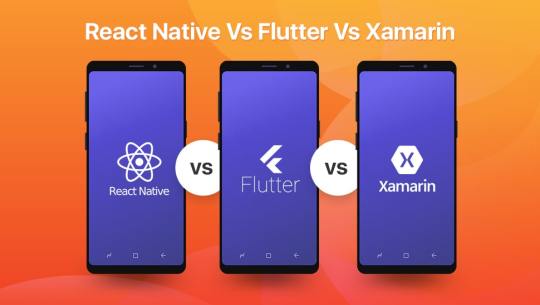#flutter vs react native
Explore tagged Tumblr posts
Text

Flutter vs React Native- every investor questions which is the best platform for their app development as they need a fully optimal solution for their business growth. Although the debate between Flutter and react native is nonnegotiable, both platforms have their USP, so let’s understand which is the most preferable framework as per your needs.
#Flutter App Development Company#Flutter vs React Native#Flutter App Development Services#Flutter and React Native
0 notes
Text
In this guide, we compare Flutter vs. React Native for 2024. Explore their unique features, performance differences, and when to choose each framework.
#Flutter App Development Company#React Native App Development Company#Flutter Mobile App Development#Mobile App Development#Moweb Technologies#Flutter vs React Native#Best Guide for Flutter vs React Native
0 notes
Text
youtube
Are you struggling to decide between Flutter and React Native for your next app project?
Join us as we break down the pros and cons of both frameworks. We'll compare their performance, learning curve, cross-platform compatibility, and more to help you make an informed decision.
Key points covered:
1. Performance: Which framework is faster?
2. Learning curve: Which is easier for beginners?
3. Cross-platform compatibility: How well do they work on iOS and Android?
4. Community support: Which has a larger and more active community?
Whether you're a seasoned developer or just starting out, this video will provide valuable insights to help you choose the right framework for your app.
#app development#app developer#flutter vs react native#flutter app development#reactnative app developement#Youtube
0 notes
Text
In the rapidly growing world of mobile apps, developers are constantly on the lookout for efficient and effective ways to build cross-platform applications. This is where frameworks like Flutter and React Native come in – providing the ability to develop mobile apps for multiple platforms using a single codebase. But Flutter vs React Native which one should you choose? In this article, we will compare the key features, development process, platform support, performance and testing, popularity and adoption of Flutter and React Native to determine which is the better mobile app development framework. Read More About : https://www.krishangtechnolab.com/flutter-vs-react-native/
#flutter#react native#cross platform#app developers#app development#mobile app development#hire mobile app developers#mobile app company#mobile application development#flutter app development#flutter app developers#kotlin#iconic#flutter vs react native#app developing company
1 note
·
View note
Text
0 notes
Text

Flutter or React Native: Making the Decision in 2023
Deciding between Flutter and React Native in 2023? Get the insights you need to make the right choice in this expert guide.
#Flutter or React Native#React Native#Flutter#platform mobile app development#mobile app development#Flutter vs React Native
0 notes
Text
#React Native vs Flutter#React Native vs Flutter app development#flutter vs react native#hire flutter developers
1 note
·
View note
Link
Here is a brief comparison between Flutter and React native and which one can be the appropriate one for your small business
1 note
·
View note
Text

Flutter and React Native are both popular frameworks for building mobile applications. Flutter is a cross-platform framework developed by Google that uses a single codebase to build high-performance, visually appealing apps for both Android and iOS. It has a rich set of customizable widgets, making it easy to create complex UI designs. Flutter also has a hot reload feature that allows developers to see real-time changes, making the development process faster. React Native is a cross-platform framework developed by Facebook that allows developers to build high-quality apps for both iOS and Android. React Native uses JavaScript and supports third-party plugins, making integrating with other libraries and tools accessible. It also has a large and active community, providing developers with extensive documentation, support, and pre-built components. Ultimately, the choice between Flutter and React Native depends on the project's specific needs. Framework that provides a fast development process and excellent performance, then Flutter may be the best choice. The framework that has a large community and supports a wide range of third-party libraries, then React Native may be a better fit.
1 note
·
View note
Text
React Native vs. Flutter: Key Differences Explained
This blog highlights the key differences between React Native and other popular mobile development frameworks like Flutter, Xamarin, and native development. It provides insights into performance, development speed, learning curve, community support, and cost.
Whether you're a startup or an enterprise, this guide will help you understand which framework aligns with your project goals, budget, and technical requirements. With Shiv Technolabs, discover expert solutions tailored to build high-performing mobile applications for your business needs.
0 notes
Text
Flutter vs. React Native: Best Framework for Your Cross-Platform App

Choosing the right framework is critical to the success of your app. In the world of cross-platform development, React Native and Flutter stand out as the go-to choices for building apps efficiently for Android and iOS from a single codebase. Both frameworks offer unique advantages, but which one is best suited for your project? Let’s dive in to help you decide.
Understanding React Native
React Native, created by Facebook in 2015, enables developers to create mobile applications using JavaScript. By extending the popular React framework for web development to mobile platforms, React Native simplifies development without sacrificing a native-like user experience.
Key Features of React Native:
Reusable Codebase: Write once, run on both Android and iOS with minimal adjustments.
Native Rendering: Uses native UI components, ensuring apps look and feel like true native apps.
JavaScript Expertise: Leverages an already widely used programming language, reducing the learning curve for teams.
Ideal Use Cases:
React Native excels in developing apps that prioritize functionality, such as:
Social Media Apps: Facebook and Instagram are prime examples.
E-commerce Apps: Platforms focusing on core features and fast iteration.
MVPs for Startups: Quick time-to-market with robust functionality.
When it comes to custom mobile app development, React Native provides a practical solution for businesses aiming to deliver apps across multiple platforms while optimizing time and costs.
Flutter: Google’s Vision for Cross-Platform Apps
Launched in 2017, Flutter is Google's open-source framework for creating visually stunning and highly performant apps. Powered by Dart, Flutter is designed for developers who value consistent design and seamless performance across platforms, including mobile, web, and desktop.
Key Features of Flutter:
Rich Widgets Library: A customizable set of widgets allows precise control over UI design.
Hot Reload: Real-time changes boost productivity during development.
Platform Independence: Build apps that scale beyond mobile to web and desktop platforms.
Ideal Use Cases:
Flutter shines in applications requiring advanced graphics and consistency, such as:
Graphically Intense Apps: Complex animations and interactive designs.
Multi-Platform Apps: Apps needing a unified experience across devices.
Startups with Design-First Focus: Beautiful, responsive apps built efficiently.
For developers focused on web app development, Flutter's multi-platform capabilities make it an excellent choice for creating seamless digital experiences across devices.
What Are the Key Differences Between Flutter and React Native?
When deciding between Flutter and React Native, it's essential to understand their key differences to choose the right framework for your project.
1. Programming Language
React Native uses JavaScript, making it a natural choice for teams with web development experience.
Flutter uses Dart, which offers robust features but has a smaller developer community.
2. UI/UX Customization
React Native relies on native components, providing a consistent platform look but less flexibility for custom UI designs.
Flutter uses its widget-based system, enabling highly customizable and visually consistent designs.
3. Performance
React Native uses a JavaScript bridge, which may impact performance in graphics-heavy apps.
Flutter compiles directly to native code, ensuring better performance for complex animations and high-performance apps.
4. Multi-Platform Support
React Native focuses on mobile, with third-party tools enabling web functionality.
Flutter natively supports mobile, web, and desktop, making it a more versatile choice.
Advantages and Disadvantages of React Native and Flutter
When choosing between React Native and Flutter, understanding their pros and cons can help streamline your decision for mobile app development.
React Native: Pros and Cons
Advantages
Large Community Support: Built on JavaScript, React Native benefits from a vast developer community and numerous libraries.
Faster Development: If you’re familiar with JavaScript and React, React Native allows faster transitions into mobile app development.
Cost Savings: A single codebase works for both iOS and Android, reducing resources.
Disadvantages
Performance Issues: May struggle with complex animations or graphics due to the JavaScript bridge.
Limited Customization: Relies on native components, limiting UI design options.
Dependency on Third-Party Libraries: Advanced features depend on third-party tools, which can cause delays.
Flutter: Pros and Cons
Advantages
Superior Performance: Compiles directly to native code, improving speed, especially for animations.
Highly Customizable UI: Uses widgets for advanced and flexible UI design.
Single Codebase Across Platforms: Works for mobile, web, and desktop development.
Disadvantages
Larger File Size: Flutter apps consume large amount of storage
Limited Dart Expertise: Dart is less common than JavaScript, making skilled developers harder to find.
Still Maturing for Web Support: Flutter’s web capabilities are still evolving, with some performance and compatibility challenges.
Future of Cross-Platform Development
The demand for cross-platform frameworks continues to grow, driven by the need to build apps efficiently for multiple platforms. React Native and Flutter are both evolving rapidly, supported by major tech companies like Facebook and Google. While React Native leads in market share, Flutter’s rich UI capabilities and growing popularity make it a serious contender.
React Native or Flutter : Which one to pick
The choice between Flutter and React Native depends on your project goals, team expertise, and app requirements. Both frameworks are powerful tools that cater to different needs, ensuring you can deliver an excellent user experience.
#web development#app developing company#web app development#Flutter vs. React Native#best app development framework
0 notes
Text
React Native and Flutter app development, delivering high-performance cross-platform mobile solutions tailored to your business needs.
0 notes
Text
Flutter App Development Services

Flutter app development offers a powerful way to create beautiful, high-performing apps for iOS and Android using a single codebase.Our expert Flutter developers can help you with every stage of your app's journey, from concept to deployment. We specialize in:
Cross-platform app development: Reach a wider audience with a single codebase for both iOS and Android.
Native-like performance: Build apps that feel natural and responsive on any device.
Custom UI/UX design: Create stunning visuals and intuitive user experiences.
App maintenance and support: Ensure your app stays up-to-date and functioning smoothly.
Whether you have a simple app idea or a complex project, Flutter development services can help you turn your vision into reality.
#Flutter App Development#Hire Flutter App Developers#Build Mobile Apps with Flutter#Flutter vs. React Native#Best Practices for Flutter Development#Flutter App Development Services
0 notes
Text
Flutter Vs. React Native – Which is Better For You?

Flutter vs. React Native – the battle of cross-platform app development. Flutter, Google's UI toolkit, offers hot reload and native-like performance. React Native, backed by Facebook, boasts a large community and easy integration with existing apps. Choose Flutter for polished designs or React Native for rapid development and familiarity with JavaScript.
0 notes
Text
Exploring Cross-Platform Development: Flutter vs. Xamarin vs. React Native
Cross-platform development has become increasingly popular in the mobile app development landscape, allowing developers to build applications that run seamlessly on multiple platforms with a single codebase. Among the leading cross-platform frameworks are Flutter, Xamarin, and React Native, each offering unique features and capabilities. In this article, we’ll explore these frameworks in-depth,…

View On WordPress
0 notes